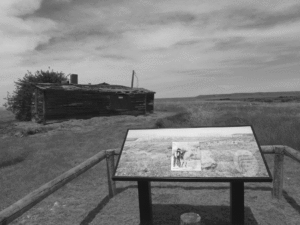Heroic Canadian chronicled the vanishing frontier
Posted on January 25, 2018 by Maple Creek
Dominique Liboiron
“My heroes have always been cowboys,
And they still are, it seems.”
Willie Nelson sang those lyrics back in 1980 and his hit song reached number one on country music charts. Although it first appeared 38 years ago, “My Heroes Have Always Been Cowboys” is still played on some radio stations.
The song raises an important point – we all need heroes. A hero is a model who guides us to be a better version of ourselves. Unfortunately, movies, television and the Internet are flooded with content from the United States and that makes it a bit tricky at times for Canadians to find heroes.
That being said, we live in a part of the world that has attracted its share of heroic people. Adventure seekers have been drawn to the West since the early days of the frontier. One of them was Will James.
As a boy, he dreamed of becoming a cowboy. Like the famous naturalist Gray Owl, an Englishman who successfully passed himself off as a Native, James assumed a fake identity and became an author who chronicled the vanishing frontier.
Born Joseph Ernest Dufault on June 6, 1892 in Quebec, Will James, as he was later known, became one the best-loved Western writers. His novels rank on par with Zane Grey and Louis L’Amour whose legacies include classics such as “Riders of the Purple Sage” and “How the West was Won.” Besides his obvious literary talent, Dufault was an excellent illustrator and many consider his drawings of horses superior to even those of Charles Russell who is generally recognized as the preeminent Western artist.
As a young man, Dufault came to Saskatchewan. He spent time in the Cypress Hills and also worked on ranches in the Val Marie area. In fact, the line shack he lived in still stands in Grasslands National Park. After becoming more familiar with the ranching lifestyle, he became a cowboy and changed his name.
After leaving Val Marie, James was arrested for rustling and spent time in an American prison. According to local legend, he convinced the parole board to release him by showing his sketches and promising to use his skills to write children’s’ books instead of stealing cattle.
A prolific author, James wrote and illustrated 23 books. In 1922, his first work was published titled “Bucking Horse Riders.” In 1927, he received the John Newbery Medal for “Smoky the Cow Horse,” the book for which he’s best-known. The Newbery Medal has been awarded by the American Library Association since 1922 to recognise excellence in children’s literature. The prize is one of the most prestigious in the United States.
In the story, Smoky, a wild horse, is eventually caught and broken by a cowboy named Clint. He becomes the best cow horse, but is unfortunately stolen. Smoky lives through a series of adventures before being returned to Clint.
James also wrote a fictional autobiography in 1930 called “Lone Cowboy.” His final book, “The American Cowboy,” appeared in 1942.
There are many parallels between James and his contemporary Gray Owl. Both came to Saskatchewan at a time of change and wrote of the disappearing way of life they loved. Gray Owl was trapper who lived off the land at the end of the fur trade economy. James witnessed the arrival of settlers and the impact agriculture had on open-range ranching. Both their former homes are preserved in national parks. Gray Owl shared his cabin with beavers in Waskesiu National Park. In fact, Gray Owl’s wife wasn’t impressed with the smell so she had her husband build her another cabin close by. While James never shared his cabin with beavers, his crumbling old shack currently provides shelter to many species of animals such as barn swallows and rabbits.
James wasn’t perfect, but then again who is? Despite the challenges he faced, he followed his dream of becoming a cowboy and, as Willie Nelson sang, of “pursuin’ the life of his high ridin’ heroes.” Along the way, James left a legacy of novels and illustrations that share his appreciation of cowboy culture and that all of us can enjoy. For that, he deserves the title of Canadian hero.
SUBMITTED PHOTO
Author, illustrator, cowboy – Will James is one of my heroes for many reasons, but most of all because he turned his dream into reality. The line shack where he once lived is still standing in Grasslands National Park near Val Marie.



Leave a Reply
You must be logged in to post a comment.